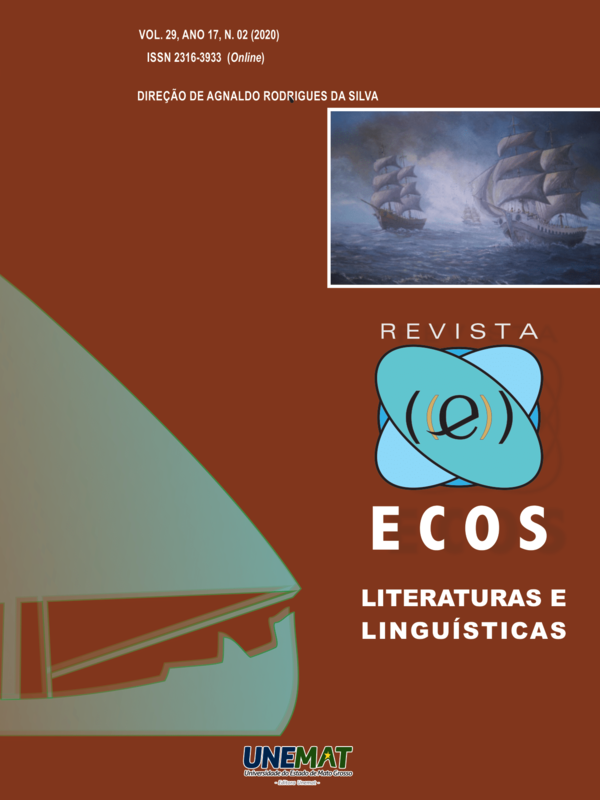EFEITO RETROATIVO DO EXAME TOEFL IBT EM UM NÚCLEO DE LÍNGUAS/THE WASHBACK EFFECT OF THE TOEFL IBT TEST IN A LANGUAGE CENTER
Resumo
Resumo: Este artigo apresenta os resultados de uma pesquisa sobre o efeito retroativo que o exame TOEFL iBT exerce no ensino em um Núcleo de Línguas (NucLi), criado como parte do programa Inglês sem Fronteiras (IsF) em instituições federais. São triangulados dados de observações de aulas em dois cursos presenciais, um de inglês geral, e o outro com fins preparatórios para o TOEFL iBT; questionário aplicado junto à coordenadora pedagógica; entrevista com professores e análise de documentos. Foi identificado efeito retroativo forte no formato e conteúdo nas aulas, assim como na utilização do material didático somente no curso preparatório. Além disso, os resultados demonstram que professores têm atitudes e percepções distintas sobre o exame, assim como maneiras de operacionalizar a visão de linguagem e abordagem de ensino.
Palavras-chave: Efeito retroativo; Avaliação de línguas; Exame de proficiência em inglês
Downloads
Referências
ALDERSON, J. C., WALL, D. Does washback exist?, Applied Linguistics, 14, p.115-129, 1993. https://doi.org/10.1093/applin/14.2.115
ALDERSON, J.C., HAMP-LYONS, L. 1996. TOEFL Preparation Courses: A Study of washback. Language Testing, 13 (3), p.280-297, 1996. https://doi.org/10.1177/026553229601300304
ALDERSON, J.C., WALL, D. The Sri Lankan O-Level English Language Evaluation Project Fourth and Final Report. Lancaster: Department of Linguistics and Modern English Language – Institute for English Language Education, 1993.
ALMEIDA FILHO, J.C.P. Dimensões comunicativas no ensino de língua. Campinas: Pontes, 1993.
ANDREWS, S. The Washback Effect of Examinations: Its Impact Upon Curriculum Innovation in English Language Teaching. Curriculum Forum, 4, p.44-58, 1994.
ANDREWS, S., FULLILOVE, J., WONG, Y. Targetting washback – a case study. System, 30, p.7-23, 2002. https://doi.org/10.1016/S0346-251X(02)00005-2
BUCK, G. Testing Listening Comprehension in Japanese University Entrance Exams. JALT Journal, 10, p.15-42, 1988.
CHAPMAN, D.W., SNYDER, C.W. Can high-stakes national testing improve instruction: Reexamining conventional wisdom. International Journal of Educational Development, 20, p. 457-474, 2000. https://doi.org/10.1016/S0738-0593(00)00020-1
CHENG, L. Changing language teaching through language testing: a washback study. Cambridge: Cambridge University Press, 2005.
DAVIES, A. Follow my leader: Is that what language tests do. In: LEE, Y.P., FOK, C.Y.Y., LORD, H., LOW, G. (eds). New directions in language testing. Oxford: Pergamon Press, 1985.
DENZIN, N., LINCOLN, Y. O planejamento da pesquisa qualitativa: teorias e práticas.Porto Alegre: Artmed, 2006.
FLICK, U. An introduction to qualitative research. London: Sage, 1998.
FREDERIKSEN, N. The real test bias. American Psychologist. March, 193-202, 1984. https://doi.org/10.1037//0003-066X.39.3.193
HALADYNA, T.H., NOLEN, S.B., HAAS, N.S. Raising standardized achievement test scores and the origins of test score pollution. Educational Researcher, 20, p-2-7, 1991. https://doi.org/10.3102/0013189X020005002
HAYES, B., READ, J. Test preparation in New Zealand: preparing students for the IELTS academic module. In CHENG, L., WATANABE, Y., CURTIS, A. (eds). Washback in Language Testing Research Contexts and Methods. Lawrence Erlbaum Associates, New Jersey, 2004, p. 97-111.
HUGHES, A. Testing for language teachers. Cambridge: Cambridge University Press, 2000.
McNAMARA, T. Language Testing. Oxford: OUP, 2000.
MESSICK, S. Validity and washback in language testing. Language testing, 13, p.241-256, 1996. https://doi.org/10.1177/026553229601300302
MESSICK, S. Validity. In: R. LINN (ed.). Educational measurement, p. 13-103. New York: Macmillan, 1989.
POPHAM, W. J.The merits of measurement-driven instruction, Phi Delta Kappa, 68, p. 679-682, 1987.
QI, L. Has a High-stakes Test Produced The Intended Changes? In CHENG, L., WATANABE, Y, CURTIS, A. (eds). Washback in Language Testing Research Contexts and Methods. Lawrence Erlbaum Associates, New Jersey, 2004.
SCARAMUCCI, M.V.R. Entrance Examinations and TEFL in Brazil: a case study. Revista Brasileira de Linguística Aplicada, 2, n.1, p.61-81, 2002. https://doi.org/10.1590/S1984-63982002000100004
SHOHAMY, E. Beyond Proficiency Testing: A Diagnostic Feedback Testing Model for Assessing Foreign Language Learning. Modern Language Journal, 76, p.513-521, 1992. https://doi.org/10.1111/j.1540-4781.1992.tb05402.x
SHOHAMY, E. The power of the tests: A critical perspective on the uses of language tests. Essex, UK: Longman, 2001.
SHOHAMY, E., REVES, T., BEJARANO, Y. Introducing a new comprehensive test of oral proficiency. ELT Journal, 40, p.212-220, 1986. https://doi.org/10.1093/elt/40.3.212
SPOLSKY, B. The examination-classroom backwash cycle: some historical cases. In: NUNCAN, D., BERRY, R., BERRY, V. (eds). Bringing about change in Language Education. Hong Kong: The University of Hong Kong, Department of Curriculum Studies, 1996, p. 55-66
SPRATT, M. Washback and the classroom: the implications for teaching and learning of studies of washback from exams. Language Teaching Research, 9, p. 5-29, 2005. https://doi.org/10.1191/1362168805lr152oa
THE OFFICIAL GUIDE TO THE TOEFL TEST. McGraw Hill, 5, 2012.
VERNON, P. E. The Measurement of Abilities (2nd edition). London: University of London Press, 1956.
WALL, D. Impact and washback in language testing. In C. Clapham, D.Corson (eds), Encyclopedia of language and education: Language testing and assessment, 7, p.291-302, 1997.
WATANABE, Y. Methodology in Washback Studies. In: L. CHENG, Y. WATANABE, A. CURTIS (eds), Washback in Language Testing: Research Context and Methods. Mahwah, New Jersey: Lawrence Erlbaum Associates, 2004.
WATANABE, Y. Will elimination of English from the entrance examination change classroom instruction? English teachers magazine, September, p.30-35, 1997.

